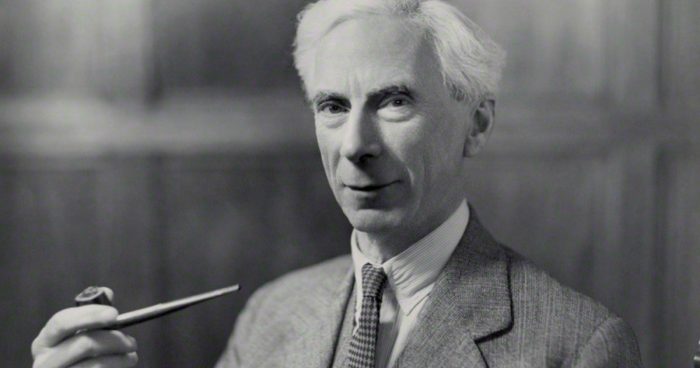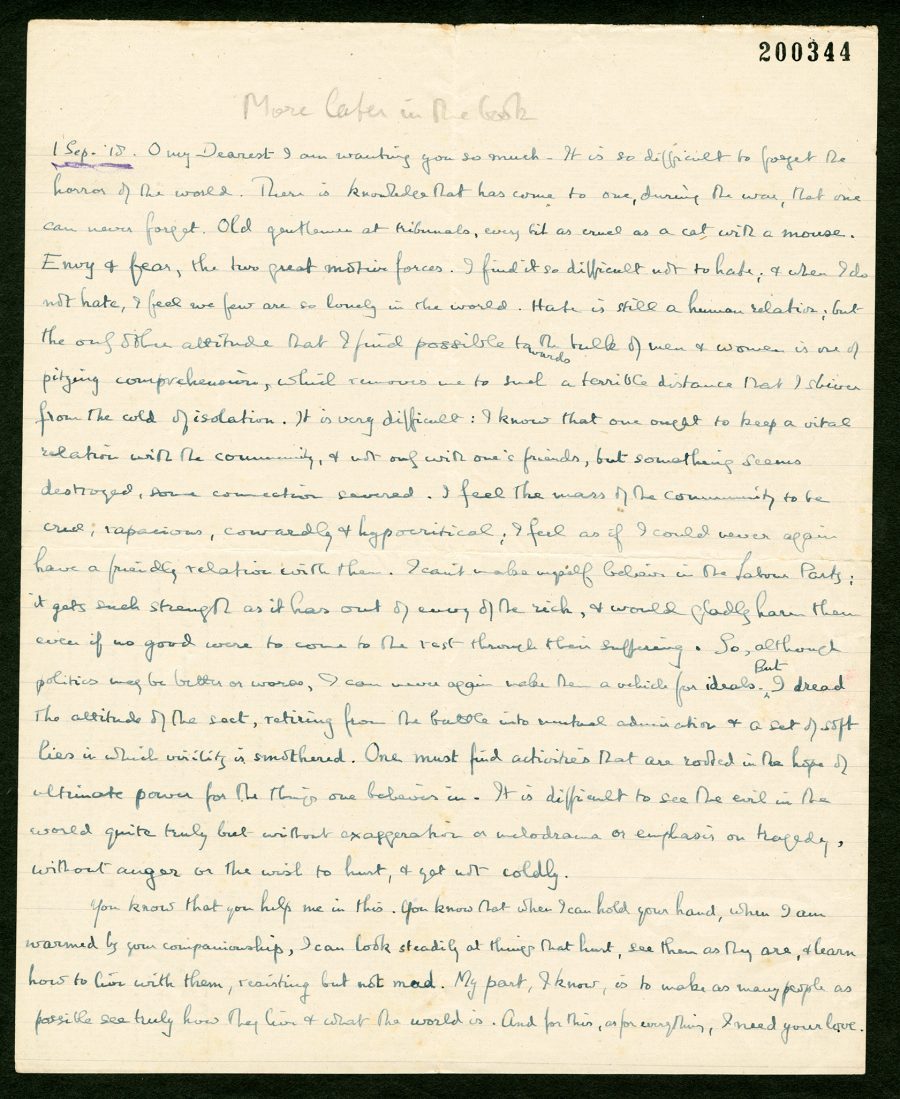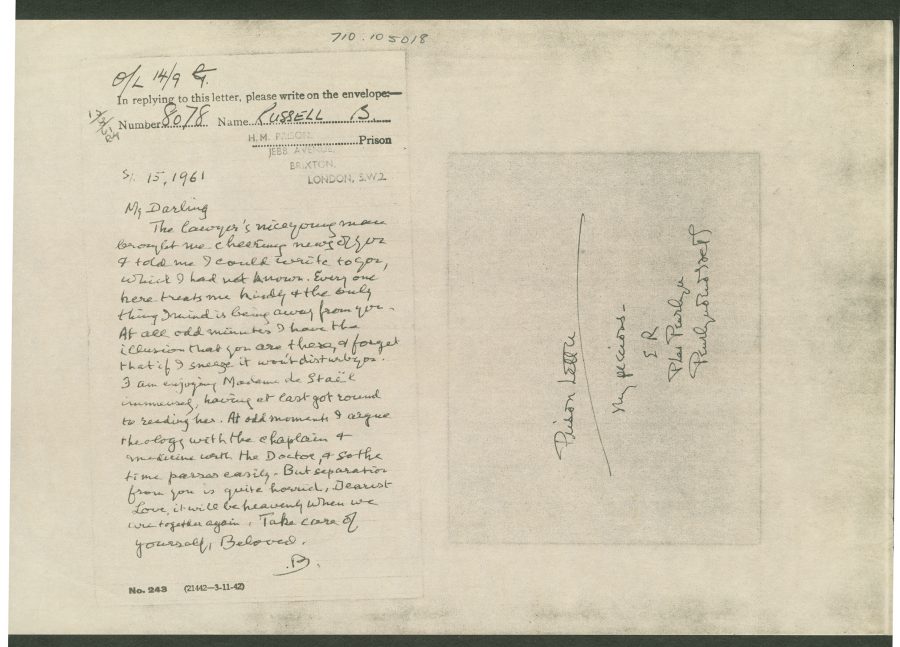
Boethius, Henry David Thoreau, Antonio Gramsci, Martin Luther King, Jr…. It’s possible, if one tried, to draw other comparisons between these disparate figures, but readers familiar with the work of all four will immediately recognize their most obvious literary commonality: all wrote some of their most impassioned and persuasive work while unjustly confined to a cell.
In the case of Bertrand Russell, however, perhaps one of the most famous figures in 20th century philosophy and intellectual life more generally, periods of incarceration in Brixton prison in 1918 and, forty-three years later, in 1961, play a minimal role in the larger drama of his writing life, despite the fact that he did a good deal of writing, including some significant philosophical work, behind bars.
Even scholars well-read in Russell’s work may have little knowledge of his prison writing, and for good reason: most of it has been inaccessible. “Now, for the first time,” writes Erica Balch at McMaster University’s Brighter World blog, “Russell’s prison letters—part of McMaster’s Bertrand Russell Archives—are being made available online through a new digitization project developed by the Bertrand Russell Research Centre. Complete with detailed annotations and fully searchable text, the project is providing scholars from around the world with access to these rarely seen materials.”

The contents of the letters reveal other reasons that Russell’s prison writing isn’t better known. He did plenty of impassioned and persuasive writing for the public outside of a prison cell—publishing fiery books, essays, and lectures against war and propaganda and in defense of free thought throughout his life. Behind bars, however, Russell’s writing turned almost solely professional and personal, in letters addressed primarily to “his then lover Lady Constance Malleson (known as ‘Colette’) and his former lover, aristocrat and socialite Lady Ottoline Morrell.”
The 105 letters “reveal the private thoughts of one of the 20th century’s most public figures and provide an interesting window on Russell’s inner life,” says Andrew Bone, Senior Research Associate at McMaster’s Bertrand Russell Research Centre. Most of the letters “were written in secret,” Balch notes, “and smuggled out of Brixton by Russell’s friends, concealed between the uncut pages of books.” Russell was only allowed one letter per week; officially sanctioned correspondence is written on prison stationary and bears the Brixton governor’s initials.
A lifelong pacifist, Russell was first jailed for six months in 1918 for a speech opposing U.S. entry into World War I. “I found prison in many ways quite agreeable,” he later wrote in his autobiography. “I had no engagements, no difficult decisions to make, no fear of callers, no interruptions to my work. I read enormously; I wrote a book, ‘Introduction to Mathematical Philosophy’... and began the work for ‘Analysis of Mind,’” a project that never reached fruition. In 1961, at age 89, he was jailed for seven days for participating in a London anti-nuclear demonstration.
During his first stay as a prisoner of Brixton’s “first division,” Russell was “allowed to furnish his cell, wear civilian clothes, purchase catered food, and most importantly, be exempted from prison work while he pursued his profession as an author," as the Bertrand Russell Research Centre points out. It’s little wonder he looked forward to the experience as a “holiday from responsibility,” he wrote in a letter to his brother, Frank, four days after he began his sentence.
Russell may not have suffered—or acquired a heightened sense of political urgency—while behind bars (at one point he was heard laughing out loud and had to be reminded by the warden that “prison is a place of punishment”). But his prison letters offer significant insight into not only the deeply emotional relationships he had with Malleson and Morrell, but also his relationship with other members of the famous Bloomsbury group and “literary celebrities such as D.H. Lawrence, and T.S. Eliot,” writes Balch, “many of whom are referenced in the letters.”

The 104 letters from 1918, including Russell’s correspondence with his brother, his publisher, The Nation magazine and others, are all available in original scans with transcriptions and annotations at the McMaster University Bertrand Russell Research Centre site. The final letter, number 105, the sole piece of correspondence from Russell’s weeklong stay in Brixton in 1961, is addressed to his wife Edith.
My Darling,
The lawyer’s nice young man brought me cheering news of you and told me I could write to you, which I had not known. Every one here treats me kindly and the only thing I mind is being away from you. At all odd minutes I have the illusion that you are there, and forget that if I sneeze it won’t disturb you. I am enjoying Madame de Staël immensely, having at last got round to reading her. At odd moments I argue theology with the chaplain and medicine with the Doctor, and so the time passes easily. But separation from you is quite horrid, Dearest Love, it will be heavenly when we are together again. Take care of yourself, Beloved.
B.
As in most of the earlier letters, Russell avoids politics and keeps things personal. But as in nearly all of his writing, the prose is lively, evocative, and poignant, revealing much about the personality behind it. While these letters may never achieve the status of great literature, by virtue of their private nature and their minor role in Russell’s major canon, that does not mean they aren’t a joy to read, for students of Bertrand Russell and anyone else who appreciates the workings of a brilliant philosophical and ethical mind. Enter the Brixton Letter archive here.
Related Content:
Bertrand Russell’s 10 Commandments for Living in a Healthy Democracy
Bertrand Russell Authority and the Individual (1948)
Josh Jones is a writer and musician based in Durham, NC. Follow him at @jdmagness
Bertrand Russell’s Prison Letters Are Now Digitized & Put Online (1918 – 1961) is a post from: Open Culture. Follow us on Facebook, Twitter, and Google Plus, or get our Daily Email. And don't miss our big collections of Free Online Courses, Free Online Movies, Free eBooks, Free Audio Books, Free Foreign Language Lessons, and MOOCs.
from Open Culture https://ift.tt/2uU9kis
via Ilumina
Comments
Post a Comment